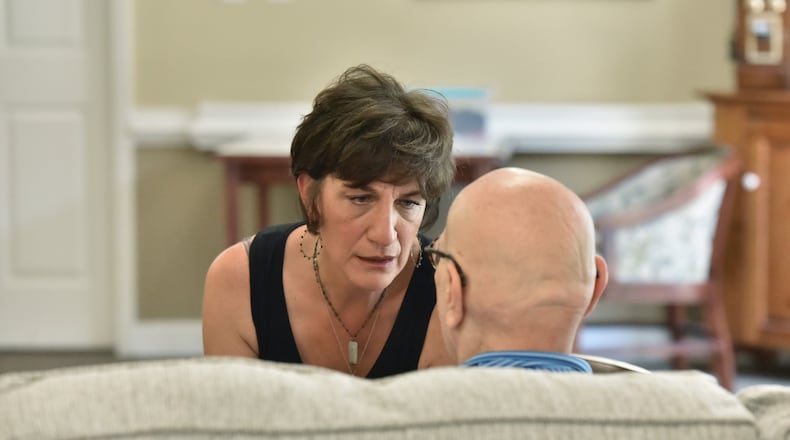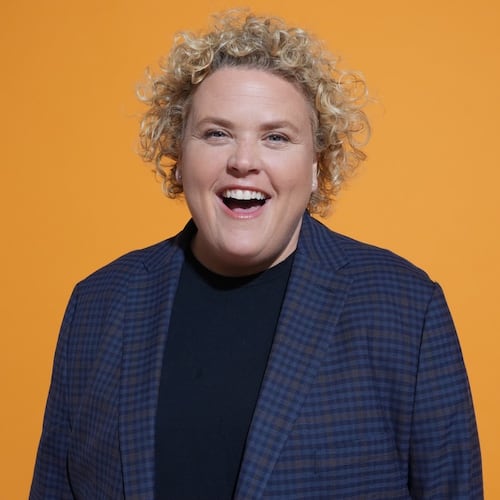The thief arrived as you might expect. Unannounced.
Karen J. Hardwick might not have noticed except after years of marriage, she’d seen some things.
Greg had always been nothing short of fastidious, organizing his closet by color and style. Nothing was ever out of place. Indeed, it made him hard to live with at times.
Then things started to change. That organized closet didn’t look so organized anymore. Greg, a stickler for time, was missing appointments. He was having trouble operating his phone and the television remote. Getting to places he’d been going for 40 years was a puzzle. He was experiencing wide mood swings and forgetting to eat, some of the same telltale signs his brother exhibited before doctors diagnosed him with Alzheimer’s disease.
By the end of 2017, Karen was pretty sure something was amiss.
“Things he once valued were slipping away,” Hardwick said. “He wasn’t fully present.”
They were at their niece’s wedding in Evergreen, Colorado, when others noticed, too.
Greg was starting to look frail. Everything about him seemed to be unraveling.
Two days after returning home, Karen decided it was time to talk.
RELATED: Glen Campbell’s death ‘brings Alzheimer’s out of the shadows.’ Now what?
“I’m not sure this is the right time and I know you don’t want to hear this, but something’s really wrong,” she said to Greg standing in the kitchen that day. “We have a problem and whatever it is, I will be with you every step of the way, but we need to get to the bottom of this.”
Greg was angry. Karen understood.
“I think he knew on some level that something was not right and it was terrifying him,” she said, looking back.
For two years, Greg, 71, had been watching his younger brother Scott battle Alzheimer’s. Could the same thing be happening to him?
In June 2018, Greg underwent a four-hour neuropsychological assessment. By Labor Day, he was more confused than ever. He didn’t know what day it was or where he was. He had become more agitated.
Greg was hospitalized, and two weeks later, doctors determined he was suffering from severe cognitive impairment. He was discharged to a memory care facility and soon diagnosed with Alzheimer’s.
Karen, 58, felt overwhelmed and grief-stricken. What would this look like for Greg, for her, for their son Matthew and Greg’s two older children, his six grandsons?
How would she manage all the pieces that needed to be managed so Greg would get the best care, so she could take care of herself and others who needed her?
RELATED: National registry to help prevent Alzheimer’s
It was important to her not only to accept Greg’s lot but also be mindful of the present as opposed to chasing what she believed life should be.
Watching Greg’s brother, Karen knew how easy it was to lose your footing. She knew Alzheimer’s as “a brutal and cruel disease that steals from the person and their loved ones everything it can so you are looking at the person but there are so many moments now where that person is no longer there.”
Days later, she drove to Matthew’s boarding school to break the news.
“You were right this summer when you were making those observations about dad and were so concerned,” Karen told him. “He has Alzheimer’s.”
That was the end of it. Matthew didn’t say anything. His sweet face said it all.
Two weeks later, his Uncle Scott passed away.
Now the thief had come for his dad.
RELATED: Cost of Alzheimer’s can devastate family’s finances
When I met Karen recently, she was ready to talk about the thief and her beloved Greg.
Greg Hardwick was a talented CPA and an avid community volunteer and runner, finishing 12 marathons and 35 AJC Peachtree Road Races. Every July Fourth, he gathered his whole family and close friends to volunteer at the start line, run the race and then celebrate with a post-race breakfast at R Thomas. When he wasn’t volunteering or running, he was on the sidelines at his son’s or grandsons’ sporting events screaming “defense.”
Credit: The Atlanta Journal-Constitution
Credit: The Atlanta Journal-Constitution
Here’s what we know about the thief: An estimated 5.8 million Americans of all ages have Alzheimer’s, according to the Alzheimer’s Association. That number includes an estimated 5.6 million people age 65 and older and approximately 200,000 individuals under age 65 who have early-onset Alzheimer’s.
Alzheimer’s isn’t just memory loss. It is the sixth-leading cause of death in the United States; and the fifth-leading cause of death among those age 65 and older and a leading cause of disability and poor health.
Despite its devastation, Hardwick said she has gained much wisdom from her experience with it.
That’s what she wanted to share when we talked, five mantras she has taken from the “front lines of memory care” that she believes will help enlighten our leaders, people who help those around them to awaken to their best selves.
“I think Alzheimer’s teaches us some pretty powerful lessons about acceptance, about how joy comes in the moments, how important it is to own our stuff as quickly as we can because if we don’t, our stuff begins to own us,” Hardwick said. “It goes into the basement and lifts weights and gets stronger.”
Hardwick, a leadership consultant and executive coach with clients all around the globe, has seen it happen not only in the corporate world but in families, too.
“We are only as sick as our secrets, which become cunning, powerful and baffling the more we hide them. Once people begin to awaken and heal from those, everything about their lives — relationships, business performance, team engagement — gets better.”
What has she learned?
Presence is powerful. Being present is not about words; it is about the deep soul work that communicates, "I am here with you."
It is never too late. Take ownership of mistakes and find ways to make amends.
Denial destroys. Acceptance gives us the courage to change what we can change while we practice gratitude for the higher purpose that is being revealed.
Joy comes in moments. This disease is a moment-by-moment process — a reminder that life is just a moment-by-moment unfolding, and therefore, so is our work.
Do the self-care basics. Get enough sleep. Eat a healthy diet. And create a spiritual practice that grounds you.
We hear a lot about that last item, but not enough people take self-care seriously. It can be hard in the face of illness and death to think of yourself. But take it from someone who has been there. Karen Hardwick has had the misfortune of meeting this thief twice.
Listen to her.
Find Gracie on Facebook (www.facebook.com/graciestaplesajc/) and Twitter (@GStaples_AJC) or email her at gstaples@ajc.com.
About the Author
The Latest
Featured





